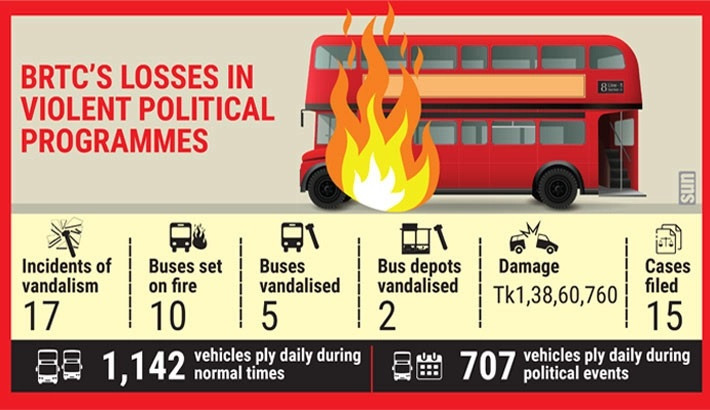
The Bangladesh Road Transport Authority (BRTC) has incurred a loss of Tk1,38,60,760 in the incidents of vandalism and arson attacks on buses, depots and other establishments carried out across the country by miscreants during political programmes, like hartals and blockades, enforced by the main opposition party BNP and its allies since 28 October last year.
So far, 17 incidents of sabotage have taken place – 10 bus arson, five buses vandalised, vandalism inside two bus depots in Motijheel and Mirpur. The BRTC has filed 15 cases
with different police stations in connection with the incidents, according to the BRTC.
BRTC buses running under the depots in Motijheel, Joarsahara, Rangpur, Narsingdi, Mirpur, Khulna, Kalyanpur, Mohammadpur and Gabtali were attacked damaged.
BRTC Chairman Md Tazul Islam told the Daily Sun, “BTRC buses have been vandalised and set on fire across the country. Many private bus companies do not run buses on the days when political parties enforce blockades and hartals but BRTC buses run across the country, though fewer buses compared to normal times.”
“As the fewer number of buses plied the streets as a result of political unrest, our income has decreased. An average of 707 vehicles plied on strike-blockade days whereas 1,142 buses ply the streets on normal days.”
Although the income was slightly less, the income from trucks and training has not decreased and everyone got the salary on time, he added.
He also said the damaged buses would be sent for repair very soon.
Sources in the BRTC accounts department said the state-owned transport organisation earned Tk49-Tk50 crores in September last year, which started to drop since 28 October. In November, the company’s income was about Tk36 crores.
Bangladesh Jatri Kalyan Samity Secretary General Mozammel Hoque Chowdhury told the Daily Sun, “Sabotaging vehicles hinder the safe movement of passengers. The country also incurs economic losses. So, consensus is needed among political parties to avoid violent movement.”
The opposition parties started nationwide hartal and blockade programmes with various demands, including the dissolution of the present parliament and the 12th national election to be held under a non-partisan election-time government.
The BNP held a “grand rally” on 28 October which ended with clashes with the policemen and the leaders and activists of the party. After the Election Commission announced the polls schedule on 15 November, the BNP, the Jammat-e-Islami Bangladesh and the allies started their movement asking the commission to withdraw the election schedule.
The opposition parties enforced 12 phases of blockade for 23 days and four phases of hartal in five days.

